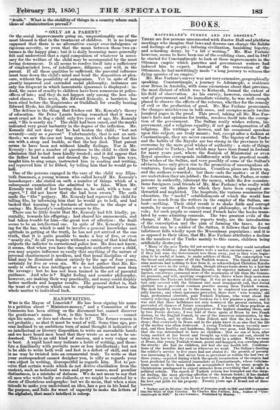" ONLY AS A PARENT "
OF the social improvements going on, unquestionably one of the most blessed is that in the treatment Of children. It is no longer supposed that there is no alternative except over-indulgence or rigorous severity, or even that the mean between those two ex- tremes is the happy plan; but it is daily becoming more generally felt and understood that a rigid compulsion of whatever is neces- sary for the welfare of the child may be accompanied by the most loving demeanour. It all seems to resolve itself into a sufficiency of singleminded lave, of intelligence, diligence, and will, in the parent. If all those qualities be sufficient, theparental influence must bear down the child's mind and bend the disposition at plea- sure, without the possibility of antagonism. Yet in spite of this greatly improved and extended social philosophy, instances are only too frequent in which lamentable ignorance is displayed : in- deed, the cases of cruelty to children have been numerous at police- offices of late ; and they do not happen only among the less edu- cated classes. This week, Mr. Edward Xenealy, a barrister, has been cited before the Magistrates at Guildhall for cruelly beating Edward Hyde, his illegitimate son. The defence is the thing that fetches out Mr. Kenealy's theory of education. Sir Peter Laurie having remarked that it was a most creel act to flog a child only five years of age, Mr. Kenealy said, " He is nearly six." The child had been caned, and the marks indicated very great barbarity in the degree of the infliction. Mr. Kenealy did not deny that he had beaten the child; "but not severely—only as a parent." Unfortunately, that is not an anti- thesis ; we saw the case not long since, in which a father beat his son with a strap and buckle, so that the boy died. That parent seems to have been not without kindly feelings. Nor is Mr. Kenealy : he put a number of questions to the child to elicit the admission that he had been kindly treated; and it did appear that the father had washed and dressed the boy, bought him toys, taught him, to sing songs, instructed him in reading and writing, and reproved him if he fibbed, by telling him that he would go to hell.
One of the persons engaged in the care of the child was Eliza- beth Summers, a young woman who called herself Mr. Kenealy's housekeeper : she stated on oath a number of things which at a subsequent examination she admitted to be false. When Mr. Kenealy was told of her having done so, he said, with a tone of regret, "I did not know that she had been sworn." The oath made the "fibs " perjury. Mr. Kenealy had reproved the child for telling fibs, by informing him that he would go to hell, and had backed that warning by a foretaste of torture in the shape of a coning • Mr. Kenealy's coadjutor swears to fibs. There can be little doubt that Mr. Kenealy had felt kindly, pa- rentally, towards his offspring; had shared his amusements, and had taken trouble for him—the great test of affection : the fault seems to be an intellectual one. In spite of Mr. Kenealy's train- ing for the bar, which is said to involve a general knowledge and aptitude in getting at the truth, he has not yet arrived at the one truth, that it is quite possible to make a boy of five, or even " nearly six," do all you require without a caning of that kind that subjects the inflictor to correctional police law. He does not know, it seems, that when you have the complete authority over a child, you may acquire influence so easily that anything of the nature of personal chastisement is needless, and that penal discipline of any kind may be dismissed almost entirely by the age of four years, certainly by five or even six. We do not gather that Mr. Ke- nealy is either a less intelligent or a less kindhearted man than
the average; he has not been trained in the art of parental guidance. nd who is ? Right feeling and sounder philosophy, however, are making their way practically, and many could display better methods and happier results. The general defect is, that the want of a system which can be regularly imparted leaves the whole matter to individual luck.


























 Previous page
Previous page